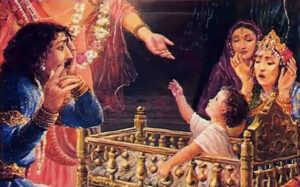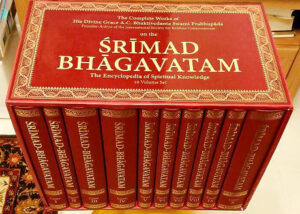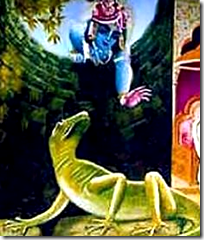Once, Lord Śiva, after giving a benediction to a demon named Vṛkāsura, the son of Śakuni, found himself in a very dangerous position. Vṛkāsura was searching for a quick and powerful benediction and was trying to decide which of the three presiding deities—Lord Brahmā, Lord Viṣṇu, or Lord Śiva—he should worship to achieve his goal.
Seeking Sage Narada’s Advice
In his quest, Vṛkāsura met the great sage Nārada and consulted him about which deity would grant him quick results. Nārada, understanding the demon’s intentions, advised him to worship Lord Śiva, stating that Lord Śiva is very quickly satisfied but also very quickly dissatisfied. Nārada cited examples of demons like Rāvaṇa and Bāṇāsura who had received great opulences by satisfying Lord Śiva with prayers.
The Sacrifice at Kedāranātha
Following Nārada’s advice, Vṛkāsura went to Kedāranātha, a pilgrimage site for devotees of Lord Śiva, and ignited a sacrificial fire to please him. To show his devotion, Vṛkāsura began to offer his own flesh by cutting it from his body. This act of worship was an example of the mode of ignorance, as described in the Bhagavad-gītā.
The Turning Point
Despite his severe penance for six days, Vṛkāsura could not see Lord Śiva. On the seventh day, in desperation, he decided to cut off his head and offer it to Lord Śiva. At this point, Lord Śiva, out of compassion, appeared to stop the demon from committing suicide. Lord Śiva healed Vṛkāsura’s injuries and offered to grant him any benediction he desired.
The Abominable Request
Vṛkāsura, being very sinful, asked for the power to kill anyone by merely touching their head. Despite understanding the evil intent behind this request, Lord Śiva, bound by his promise, granted the benediction. Vṛkāsura immediately decided to use this power to kill Lord Śiva and take away his wife, Pārvatī, for his personal enjoyment.
Lord Śiva in Danger
Realizing the danger, Lord Śiva fled from Vṛkāsura, traveling across different planets, seeking help from other deities, but none could save him. Finally, he approached Lord Viṣṇu in Śvetadvīpa, beyond the influence of the external energy.
Lord Nārāyaṇa’s Intervention
Lord Viṣṇu, in the form of a brahmacārī, approached Vṛkāsura and cleverly convinced him to test the benediction on himself. Deceived by Lord Nārāyaṇa’s words and the power of his superior illusion, Vṛkāsura placed his hand on his own head, which immediately cracked, causing his death.
Conclusion
The demigods showered flowers on Lord Nārāyaṇa, praising Him and offering their obeisances. Lord Viṣṇu informed Lord Śiva that the demon’s sinful activities led to his downfall. Thus, by the grace of Lord Nārāyaṇa, who is transcendental to all material qualities, Lord Śiva was saved from the impending danger.
Moral of the Story
This story highlights the difference between devotees and demons. Devotees worship without seeking harmful benedictions and rely on the protection and mercy of the Supreme Personality of Godhead. On the other hand, demons misuse the powers granted to them for selfish and destructive purposes, leading to their own downfall.
Reflection from the Srimad Bhagavatam
As narrated by Srila Prabhupada in his Bhaktivedanta purport of the Eighty-eighth Chapter of Kṛṣṇa, “The Deliverance of Lord Śiva,” this story emphasizes the importance of righteous devotion and the dangers of misusing divine powers.



